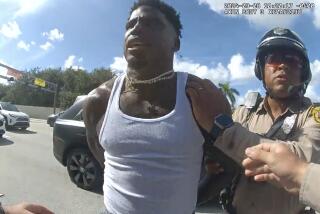Decision on King Is Left to State : Law enforcement: The district attorney’s office sends the case to the attorney general. The beating victim could be charged in connection with his arrest last week.
- Share via
Citing an unusual conflict of interest, Dist. Atty. Ira Reiner Monday asked the state attorney general to decide whether to charge Rodney G. King with assault after his encounter with Los Angeles Police Department vice officers.
Prosecutors said it would be improper for them to consider filing felony charges against King when they are already prosecuting four police officers for beating him last March 3.
King, who was catapulted to fame by a witness’s videotape of the beating incident, was arrested--but not booked--last Tuesday when he allegedly tried to run down an undercover vice officer in Hollywood with his car.
The district attorney’s decision to transfer the case came hours after Los Angeles police submitted their felony assault case--without recommending whether any charges be filed.
“Mr. King is the victim in a pending prosecution being handled by this office,” Reiner said in a letter to Assistant Atty. Gen. Carol Pollack.
“Since a filing decision on this new matter could have an impact on our pending trial, it is appropriate that the attorney general’s office review the reports and make the decision to file or not file criminal charges,” said the letter. The trial for the officers is scheduled to begin June 19.
Reiner’s request marks the second time he has referred a case involving King to the attorney general. In the earlier case, state investigators found insufficient evidence to prosecute King for two robberies that occurred prior to the March beating.
Los Angeles Police Cmdr. Rick Dinse, who is coordinating the King beating case, said Northeast Division detectives had completed their investigation of last week’s incident, which allegedly involved King, a transvestite prostitute and two undercover vice officers.
Although Police Chief Daryl F. Gates initially made the decision to release King without booking him, Dinse said Monday that Gates did not review the investigation, nor did anyone else at Parker Center headquarters.
“The Northeast detectives looked at the arrest reports, interviewed witnesses, prepared follow-up reports to answer potential questions that might arise, and put them together to supply all relevant information to the D.A.,” Dinse said.
The case was reviewed by the commanding officer of the Northeast Division detectives, Lt. Raoul Vega, and by Cmdr. Maurice Moore of the Central Bureau of Operations, Dinse said.
Dinse acknowledged that it is highly unusual for police to take cases to the district attorney’s office unless they want charges to be filed. But he said the King matter is so “sensitive” that detectives want a prosecuting agency to review the facts and make an independent determination.
He said the investigation took longer than usual, both because detectives wanted to be especially thorough and because there was no need to hurry because King is not in custody. Seven hours after his arrest, King was released on his own recognizance.
According to police, King had picked up a male prostitute dressed in women’s clothes shortly before midnight May 28 and drove his gray Chevy Blazer to a nearby carport. At that point--suspecting that an unlawful sex act was imminent--vice officers approached. They said King slammed the vehicle into reverse and sped off, narrowly missing one of the officers.
King, who later flagged down a police patrol car, told authorities he fled in fear because he thought the men were robbers.
He faces a possible charge of assault with a deadly weapon--his vehicle--which carries a maximum penalty of four years in state prison.
King could end up behind bars even if no charges are filed if state prison officials decide to revoke his parole. He was released from state prison in December, 1990, after serving one year for robbing a Monterey Park convenience store.
The state Department of Corrections said it expects to complete its investigation into last week’s incident by midweek.
Jerome DiMaggio, a regional administrator with the department, said parole agents still want to talk with the prostitute and several other witnesses.
“If we decide there is enough evidence to support a charge of assault with a deadly weapon,” DiMaggio said, “we will submit it to the Board of Prison Terms,” the parole board that meets daily at the County Jail. The board would then set a date for King to appear for a hearing.
DiMaggio said corrections officials could act on the “technical,” nonviolent violation already admitted to by King--consorting with a prostitute--without going before the parole board. But he said that violation alone would probably trigger only increased supervision and the imposition of special conditions on King’s parole, not outright revocation.
In another development Monday, about two dozen critics of Mayor Tom Bradley gathered outside his City Hall office to announce the start of a recall drive and blame the mayor for what they described as the city’s chaotic state of affairs.
The North Hollywood-based group, calling itself the Bradley Recall Coalition, has begun distributing recall petitions in malls and parks, and plans to reach other voters by direct mail, according to its chairman, Marvin Feldman.
The coalition needs to collect the signatures of at least 184,896 registered city voters by Sept. 20 if a special election is to be scheduled so voters can decide whether the mayor should be recalled.
“It is our intention to no longer allow you to bring this city down,” Feldman declared before TV cameras.
Later in the day, the mayor called Feldman “a fake.”
Times staff writer Leslie Berger contributed to this story.
More to Read
Sign up for Essential California
The most important California stories and recommendations in your inbox every morning.
You may occasionally receive promotional content from the Los Angeles Times.










